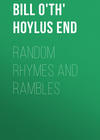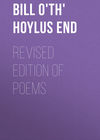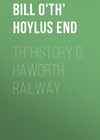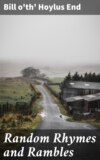Buch lesen: «Random Rhymes and Rambles», Seite 6
Schriftart:
T’ Village Aram-Skaram
In a little cot so dreary,
With eyes and forehead hot and bleary,
Sat a mother sad and weary,
With her darling on her knee;
Their humble fare at best was sparing,
For the father he was shearing,
With his three brave sons o’ Erin,
Down in the Fen country.
All her Saxon neighbours leave her,
With her boy and demon fever,
The midnight watch – none to relieve her,
Save a Little Bisey Bee:
He was called the Aram-Skaram,
Noisy as a drum clock laram,
Yet his treasures he would share ’em,
With his friend right merrily.
Every night and every morning,
With the day sometimes at dawning,
While the mother, sick and swooning,
To his dying mate went he:
Robbing his good Saxon mother,
Giving to his Celtic brother,
Who asked – for him and no other,
Until his spirit it was free.
Saw the shroud and saw the coffin;
Brought the pipes and brought the snuff in;
This little noble-hearted ruffin,
At the wake each night went he:
Sabbath morning he was ready,
Warn’d the bearers to be steady,
Taking Peter to his Biddy,
And a tear stood in his e’e.
Onward as the corpse was passing,
Ere the priest gave his last blessing,
Through the dingy crowd came pressing,
The father and the brothers three:
’Tis our mother – we will greet her;
How is this that here we meet her?
And without our little Peter,
Who will solve this mystery?
The Aram-Skaram interfered,
Soon this corpse will be interred,
Come with us and see it burried,
Out in yonder cemetery:
Soon they knew the worst, and pondered
Half-amazed and half-dumbfounded; —
And returning home, they wondered
Who their little friend could be!
Turning round to him they bowed,
Much they thanked him, much they owed;
While the tears each cheek bedewed,
Wisht him all prosperity:
“Never mind,” he said, “my brothers,
What I have done, do ye to others;
We’re all poor barns o’ some poor mothers,”
Said the little Bisey Bee.
Behold How the Rivers!
Behold how the rivers flow down to the sea,
Sending their treasures so careless and free;
And to give their assistance each Spring doth arise,
Uplifting and singing my songs to the skies.
Find out the haunts o’ the low human pest,
Give to the weary, the poor, and distressed;
What if unthankful and thankless they be,
Think of the giver that gave unto thee.
Go travel the long lanes on misery’s virge,
Find out their dark dens, and list to their dirge;
Where want and famine, and by ourselves made,
Forgive our frail follies, and come to our aid.
Give to yon widow – thy gift is thrice blest,
For tho’ she be silent, the harder she’s pressed;
A small bit o’ help to the little she earns,
God blesses the giver to fatherless bairns.
’Neath the green grassy mounds o’ yon little church yard,
An over-wrought genius there finds his reward;
And marvel thee not, when I say unto thee,
Such are the givers that give unto me.
Then scatter thy mite like nature her rain, —
What if no birdie should chant thee a strain;
What if no daisy should smile on the lea;
The sweet honeysuckle will compensate thee.
For the day will soon come, if thou gives all thou may,
That thou mayest venture to give all away;
Ere nature again her balmy dews send,
Thou may have vanished my good giving friend.
The World’s Wheels
Aw steady an’ easy t’oud world’s wheels wod go,
If t’folk wod be honist an’ try to keep so;
An’ at steead o’ been hastey at ivvery wun,
Let us enquire afore we condemn.
A man may do wrong an’ scarce be to blame,
Or a woman be bad e nout bud her name;
But which on us ought ta say ought unto them,
Unless we enquire afore we condemn.
If a Rose she sud flurish her sisters among,
It izant ta say her poor sister is wrong;
That blighted one there may be nipt in the stem,
So let us enquire before we condemn.
Yond vessel that tussels the ocean to plough,
While waves they are dashing and winds they do blow,
May be shattered asunder from stern unto stem,
So let us inquire before we condemn.
We are certain o’ wun thing an’ that izant two,
If we do nothing wrong we have nothing to rue;
Yet many a bright eye may be full to the brim,
So let us inquire afore we condemn.
Then speak not so harshly, withdraw that rash word,
’Tis wrong to condemn till the story is heard;
If it worrant for summat sho might be a gem,
So let us enquire afore we condemn.
Full o’ Doubts an’ Fears
Sweet sing the birds in lowly strains,
All mingled in their song;
For lovely Spring is here again,
And Winter’s cold is gone.
All things around seem filled with glee,
And joy swells every breast;
The buds are peeping from each bush,
Where soon the birds will rest.
The meadows now are fresh and green,
The flowers are bursting forth,
And nature seems to us serene,
And shows her sterling worth.
The lark sores high up in the air,
We listen to his lays;
He knows no sorrow nor no care,
Nor weariness o’ days.
But men, though born of noble birth,
Assigned for higher spheres,
Walks his sad journey here on earth
All full o’ doubts and fears.
It Izant so we Me
Bright seems the days when I was young
Fra thought, fra care, fra sorrow free;
As wild waves rippled i’ the sun,
Rolled gaily on, and so wi’ me.
More bright the flowers when I was young,
More sweet the birds sang on the tree;
While pleasure and contentment flung
Her smiles on them, and so wi’ me.
The naked truth, I told when young,
Though tempted wi hypocracy;
Though some embraced from it I sprang,
And said it izant so wi’ me.
Aw saw the canting jibs when young,
Of saintly, sulky misery;
Yet poked aw melancholy’s ribs,
And said it izant so wi’ me.
Though monny a stone when aw was young,
His strong upon me memory;
Aw thru when young and hed um flung,
If they forgive ’tis so wi’ me.
Could money buy o’ Nature’s mart,
Again our brightest days to see;
Ther’s monny a wun wod pawn ther shirt,
Or else they’d buy – and so wi me.
Yet after all aw oft luke back,
Without a pang o’ days gone past,
An hope all t’ wreng aw did when young,
May be forgeen to me at last.
Ode to an Herring
Wee silvery fish, who nobly braves
The dangers o’ the ocean waves,
While monsters from the unknown caves
Make thee their prey;
Escaping which the human knaves
On thee ligs way.
No doubt thou was at first designed
To suit the palates o’ mankind;
Yet as I ponder now I find,
Thy fame is gone:
With dainty dish thou’rt behind
With every one.
I’ve seen the time thy silvery sheen
Were welcome both at morn and e’en,
Or any hour that’s in between,
Thy name wer good;
But now by some considered mean
For human food.
When peace and plenty’s smiling brow,
And trade and commerce speeds the plough;
Thy friends that were not long ago,
Such game they make;
Thy epitaph is soldier now,
Or two-eyed snake.
When times are hard we’re scant o’ cash,
And famine hungry bellies lash,
And tripes and trollabobble’s trash
Begins to fail,
Asteead o’ soups an’ oxtail ash,
Hail! herring, hail!
Full mony a time t’as made me groan,
To see thee stretched, despised, alone;
While turned-up noses passed have gone,
O’ purse-proud men!
No friends, alas! save some poor one
Fra t’ paddin can.
Whoe’er despise thee, let them know
The time may come when they may go
To some fish wife, and beg to know
If they can buy
The friendship o’ their vanquished foe,
We weeping eye.
To me nought could be better fun,
Than see a duke or noble don,
Or lord, or peer, or gentleman,
In search o’ thee:
And they were bidden to move on,
Or go t’at sea.
Yet I will sing thy praise, wee fish;
To me thou art a dainty dish;
For thee, ’tis true, we often wish,
My little bloater;
Either salted, cured, or shining fresh
Fra yon great water.
If through thy pedigree we peep,
Philosophy from thee can keep,
To me I need not study deep,
There’s nothing foreign;
For aw like thee, am sold too cheap,
My little herring.
Our Poor Little Factory Girls
They are up in the morning right early,
They are up sometimes afore leet;
Aw hear their clogs they are clamping,
As t’ little things goes dahn the street.
They are off in the morning right early,
With their baskets o’ jock on their arms;
The bell is ting-tonging, ting-tonging,
As they enter the mill in a swarm.
They are skarpring backward and forward,
Their ends to keep up if they can;
They are doing their utmost endeavours,
For fear o’ the frown o’ man.
Wi’ fingers so nimble and supple,
They twist, an’ they twine, an’ they twirl,
Such walking, an’ running, an’ kneeling,
As the wee little factory girl.
They are bouncing abaht like a shuttle,
They are kneeling an’ rubbing the floor;
While their wee little mates they are doffing,
Preparing the spindles for more.
Them two little things they are thickest,
They help one another ’tis plain;
They try to be best and the quickest,
The smiles o’ their master to gain.
And now from her ten hours’ labour,
Back to her cottage sho shogs;
Aw hear by the tramping and singing,
’Tis the factory girl in her clogs.
An’ at night when sho’s folded i’ slumber,
Sho’s dreaming o’ noises and drawls;
Of all human toil under-rated,
’Tis our poor little factory girls.
We Him haw call my awn
The branches o’ the woodbine hide
My little cottage wall,
An’ though ’tis but a humble thatch,
Aw envy not the hall.
The wooded hills before my eyes
Are spread both far and wide;
An’ Nature’s grandeur seems to dress,
In all her lovely pride.
It is, indeed, a lovely spot,
O’ singing birds an’ flowers;
’Mid Nature’s grandeur it is true,
I pass away my hours.
Yet think not ’tis this lovely glen,
So dear in all its charms;
Its blossomed banks and rippled reels,
Freed from the world’s alarms.
For should love’s magic change the scene,
To trackless lands unknown;
’Twor Eden in the desert wild,
Wi him aw call my own.
A Yorkshireman’s Christmas
Aw have ten or twelve pounds o gooid meit,
A small cheese and a barrel o’ beer;
Aw’ll welcome King Christmas to neet,
For he nobbut comes once in a year.
Send our Will dahn to Tommy Spoyle Wood’s,
And tell him to send up a log;
An’ tell him and Betty to come,
For Tommy’s a jolly oud dog.
Aw mean to forget all my debts,
An’ aw mean to harbour no greef;
Nobbut emptying glasses an’ plates
O’ their contents o’ beer and gooid beef.
Them barns they care nought abaht drink,
Like us at’s advanced into years;
So Sally, lass, what does ta think,
If ta buys um some apples an’ pears?
Our David’s a fine little lad,
An’ our Nancy’s a fine little lass;
When aw see um aw do feel so glad,
So bring me a quart an’ a glass!
Come, Sally, an’ sit be my side?
We’ve hed both were ups and were dahns;
Awm fane at aw made thee my bride,
An’ am prahd o’ both thee an’ wer barns.
We’re as happy as them at’s more brass,
E their festival holly-decked hall;
We envy no mortal, old lass;
Here’s peace and gooid will unto all.
And may every poor crater ta neet,
If never before in his loife,
Have plenty to drink an’ ta eat,
For both him, an’ his barns, an’ his woife.
The Fethered Captive
My little dappled-wingged fellow,
What ruffin’s hand has made thee wellow?
Haw heard while down in yonder hollow,
Thy troubled breast;
But I’ll return my little fellow,
Back to its nest.
Some ruffin’s hand has set a snickle,
And left thee in a bonny pickle;
Who e’er he be, haw hope old Nick ’al
Rise his arm,
And mak his heead an’ ear-hoil tickle
We summat warm.
How glad am aw that fate while roaming,
Where milk-white Hawthorns’ blossoms blooming,
As sent me footsteps ere the gloaming
Into this dell.
To stop some murdering hand fra drowning
Thy bonny sell.
For thou wert doomed, my bird, for ever,
Fra all thy fethered mates to sever;
Were aw not near thee to deliver
We my awn hand;
Nor never more thou’d skim the river,
Or fellowed land.
Thy fetherd friends, if thou has onny;
Tho’ friends aw fear there izant mony;
But yet thy dam for her, we Johnny,
Will fret to-day.
And think her watter-wagtail bonny
Has flown away.
Be not afraid, for net a fether
Fra of thy wing shall touch the hether,
For I will give thee altogether
Sweet liberty!
And glad am aw that aw came hither,
To set thee free.
Now wing thy flight my little rover,
Thy cursed captivity is over,
And if thou crosses t’ Straits o’ Dover
To warmer spheres;
Hoping thou may live in clover,
For years and years.
Happily, like thee, for fortune’s fickle,
I may, myself, be caught it snickle;
And some kind hand that sees my pickle
Through saving thee,
May snatch me, too, fra death’s grim shackle,
And set me free.
Trip to Malsis Hall
The day wor fine, the sun did shine,
No sines o’ rain to fall,
When t’North Beck hands, e jovial bands,
Did visit Malsis Hall.
Up by the hill o’ North Beck Mill,
Both ould an’ young did meet;
To march I trow, e two-by-two,
E processhun dahn the street.
An’ Marriner’s Band, we music grand,
Struck up wi all ther might;
Then one and all, both great and small,
March’d on we great delight.
The girls and boys, we jovial noise,
The fife and drum did play;
For every one would have some fun
On this eventful day.
Oud Joan o’ Sall wi’ all his palls,
Marched on wi’ all ther ease;
Just for a lark, some did remark,
There goes some prime oud cheese!
The Exlaheead chaps wi their girt caps,
An’ coits nut quite i’th’ fashion;
With arms ding-dong, they stretch along,
An’ put a fineish dash on.
Tom Wilkin drest up in his best,
T’ oud wife put on her fall,
For they wor bent, what come or went,
To dine at Malsis Hall.
There wor Tommy Twist, among the list,
We his magenta snaat;
Hez often said, sin he gat wed,
T’ oud lass sud hev an aht.
Amongst the lot wor oud Sam Butt,
As fine as oud Lord Digby;
An’ oud Queer Doos, wi’ his strait shoos,
An’ wi’ him Joseph Rigby.
There’s Jimmy Gill, o’ Castle hill, —
That gentleman wi’t stick, —
There’s Will an’ Sam, and young John Lamb,
An’ Ben an’ Earby Dick.
Aw scorn to lie – the reason why
It is a shame awm sure!
But among the gob, wi’ old Joe Hob,
Behould a perfect cure.
I’d quite forgot, among the lot,
There was old Pally Pickles,
Wi’ crinoline sho walks so fine,
Sho’s like a cat e prickles.
Bud to me tale, aw musant fail
Fer out on this occasion;
We heead erect, and girt respect,
We march to Keighley Station.
And Maud an’ t’ woife, az large az life,
Gat in’t train together;
They both did say, they’d have a day,
Among the blooming hether.
Nah – all fane gat in t’ train,
And Ned began to scream;
Then Master Pratt doft off his hat,
An’ pept aht at the steeam.
This jovial band, when they did land,
Got off the train so hearty,
For they all went, wi’ that intent,
To have a grand tea-party!
The country folk did gape an’ luke,
To see us all delighted,
For every one, did say begum,
Aw wish I’d been invited.
Its joy to tell, they march as well
As the Scots did ower the border,
Ould Wellington and all his men
Ne’er saw such marching order.
The lookers on, to see them come,
Get on the second story;
Right down the park they did the mark,
Coming e full glory.
Then to the place, each smiling face,
Move on in grand succession;
The lookers on did say “well done,
It iz a grand processhun!”
When they’d all past the hall at last,
They form’d into a column;
Then Jimmy Wreet, wi’ all hiz meet,
Gave aht a hymn so solemn:
Then all did raise their voice in praise,
We music in the centre;
They sang a hymn e praise o’ Him,
At iz the girt inventer.
That bit being done, they all did run,
To have a pleasant day in,
Some went there, an’ some went here,
An’ t’ Bands began o’ playing.
We mich amaze, we all did gaze,
Around this splendid park;
Then little Jake began to speak,
An’ thus he did remark: —
“At Morecambe Bay aw’ve been a day,
At Bolton Woods an’ Ilkley;
But Malsis Hall outstrip them all,
At aw’ve seen aht o’ Keighley.”
The girt park wall around the hall,
Majestically does stand;
The waving trees, an pleasant breeze,
Its loike a fairy land.
It fill’d wer eyes, we great surprise,
To see the fountain sporting;
An’ on the top, stuck on a pot,
The British flags wor floating.
The walks so grand, wi’ yellow sand,
An’ splendid wor the paving,
High over all, around the wall,
Wor flags an’ banners waving.
Nah some made fun, an’ some did run,
And women they wor swinging;
Do you ken the “Muffin Man,” —
Others they wor singing.
In sooth wor grand, to see this band,
Assemble all together;
Bud sad to say, that varry day,
Turned aht some shocking weather.
Even war nert rain, aw mun explain,
At caused a girt disaster,
All but one sort o’ breead ran short,
It wor no fault o’ t’ master.
O! Gormanton! thy bread an’ bun,
An’ judgment it wor scanty;
Oh! what a shame, an’ what a name,
For not providing plenty!
Oh, silly clown! thou might have known
To eyt each one wor able;
The country air did mack some swear,
They could ommost eyt a table.
The atmosphere, no longer clear,
The clouds are black an’ stormy;
Then all but one away did run,
Like some deserting army.
On – on! they go! as if some foe
Wor charging at the lot!
If they got there, they didn’t care
A fig for poor Will Scott!
Poor lame ould Will, remains there still,
His crutches has to fetch him;
But he’s seen the toime, when in his prime,
At nobody there could catch him.
Like some fast steed, wi’ all its speed,
All seem’d as they wor flying;
To escape the rain, an’ catch the train,
Both old and young wor trying.
One neet, old Wills, about Crosshills,
He heeard a fearful humming,
He said t’ woife, upon my life,
Aw think the French are coming!
Tha knaws reight weel at we’ve heeard tell
O sich strange things before,
So lass look quick, an’ cut thee stick,
An’ a will bolt the door.
Like drahnded rats, they pass their mates,
An’ rans dahn to the station;
And Betty Bakes an’ Sally Shakes,
Their both plump aht o’ patience.
“This is a mess,” says little Bess,
At lives o’t top o’t garden;
“There’s my new shawl an’ fine lace fall,
They’ll nut be worth a farden.”
But, hark! ding-dong goes through the throng,
The bell does give the sign,
With all its force, the iron horse,
Comes trotting up the line.
Then one by one they all get on,
Wet, fatigued and weary;
The steam does blow, old Ned doth go,
And we come back so cheery.
All satisfied we their short ride —
But sorry for the rain —
Each thenkt ther stars they’re nowt no war,
An’ we’ve got home again.
Whene’er we roam away from home,
No matter where or when,
In storm or shower, if in wer power,
To home – sweet home, return!
What we had seen – where we had been —
Each to our friend wor telling:
The day being spent, we homeward went
To each respective dwelling.
Altersbeschränkung:
12+Veröffentlichungsdatum auf Litres:
25 Juni 2017Umfang:
100 S. 1 IllustrationRechteinhaber:
Public Domain












